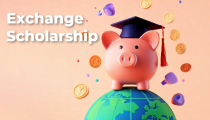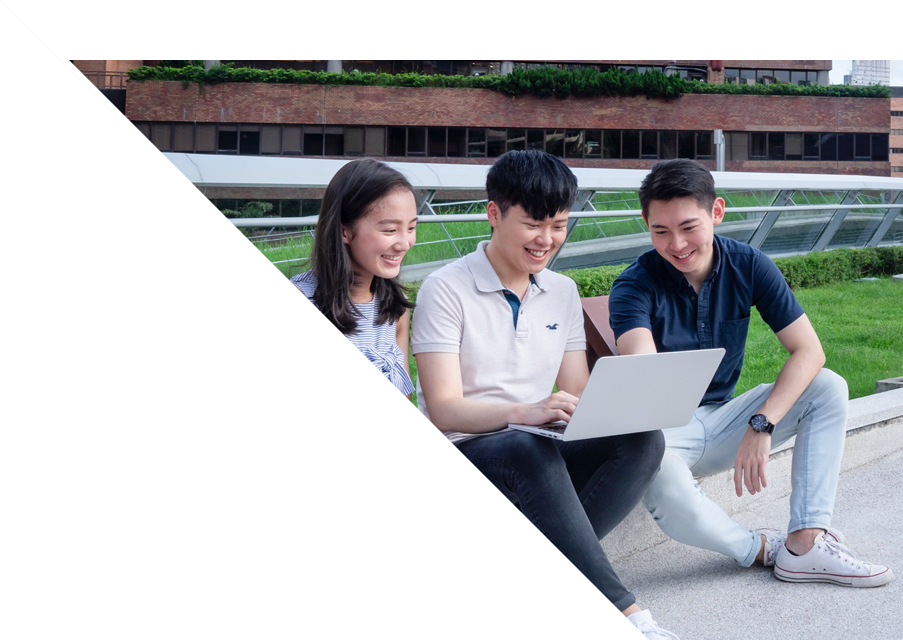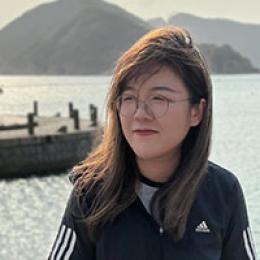Sept 2026 Entry
1 year (Full-time)
3 years (Part-time)
37
The School reviews applications in multiple rounds and makes decisions on a rolling basis.
The programme has been selected by the University Grants Committee (UGC) for the Hong Kong Future Talents Scholarship Scheme for Advanced Studies. Local students admitted to this programme can apply for the scholarship, please click here for details.
We welcome applications on a rolling basis until all available places are filled. Please note that applications submitted during the Extended Round will be reviewed based on availability, as all study places may be allocated to applicants from the Early and Main Rounds.
Early Round: 2025-10-15
Main Round: 2026-01-15
Extended Round: 2026-04-30
Early Round: 2025-10-15
Main Round: 2026-01-15
Extended Round: 2026-04-30
What's New

- Undergraduate

- Undergraduate
Programme Aims
The Master of Design offers FOUR specialisms: Innovative Business Design (IBD), Intelligent Systems Design (ISD), Smart Service Design (SSD), and Transitional Environments Design (TED).
Situated in Hong Kong, a world-class city that blends Eastern and Western influences, MDes provides an international environment for students. While MDes is conducted in English, students engage with the evolving context of Chinese culture, fostering interdisciplinary skills and cultural experiences that enhance their creative, critical and analytical thinking.
The curriculum encourages the exploration of interdisciplinary design aspects across specialisms, in alignment with global trends. Our diverse faculty, composed of international and interdisciplinary experts, equips students to take charge of their learning and development in the rapidly evolving world of design.
Innovative Business Design (IBD)
IBD is an interdisciplinary specialism designed to equip students with the skills and competencies needed to lead transformational change in organisations and society. Through its comprehensive approach, students gain a deep understanding of the complexities of today’s global market, emphasising the critical roles of creativity, innovation and responsible business practices in fostering sustainable growth.
Students are encouraged to think critically, challenge traditional business models and develop innovative solutions to complex problems.
Aims:
-
Foster Transdisciplinary Knowledge: Promote systematic integration of diverse fields.
-
Understand Essentials: Provide foundational insights into design, business and technology.
-
Practice-Based Research: Offer training and opportunities in integrative business design thinking.
-
Cultivate Talent: Develop skills to drive transformation in industries within Hong Kong.
-
Identify Opportunities: Recognise resources and strategies to enhance societal and economic well-being at local, regional, and global levels.
Characteristics:
Targeting meaning creation, IBD is the first postgraduate programme in the world focused on design-centred entrepreneurship.
Building on the unique International Design and Business Management (ID&BM) programme, IBD fosters transdisciplinary knowledge through a systematic understanding of design, business, and technology. It emphasises practice-based research, leveraging the unique resources available in Hong Kong and the Greater Bay Area.
As a hub for the innovation ecosystem, IBD facilitates collaboration among students, alumni, industrial partners, government, and other key stakeholders, acting as a catalyst for change. It offers students opportunities to engage in research and development projects, collaborate with industry professionals, and participate in industry events and workshops. These experiences enable students to refine their skills, expand their professional networks, and gain practical experience in applying design-driven innovation to real-world challenges. Additionally, IBD provides exchange opportunities for full-time students to study abroad at Thammasat University in Thailand during Semester 2.
Intelligent Systems Design (ISD)
ISD is an innovative specialism centered on interdisciplinarity, integrating intelligent technologies, systems theories and innovative design approaches. It combines professional knowledge from STEAM fields (STEM + Art & Design) to drive transformative industrial innovation. It also supports advanced and competitive industries through the application of cutting-edge technologies and processes, such as AI, Industry 4.0, robotics, and AIoT (AI + IoT), facilitated by systemic design innovations.
Aims:
-
Nurture Creativity: Enhance students’ creativity and design abilities by promoting intelligent, particularly AI-enabled, and systemic approaches.
-
Develop Technological Awareness: Cultivate awareness of current and emerging technologies in the innovation industry and advanced manufacturing environments (e.g., Industry 4.0).
-
Promote Business Understanding: Foster comprehension of supporting marketing and business practices.
-
Enhance Ethical Awareness: Increase understanding of the impact of designed systems and solutions on human, social, environmental, and global domains through responsible, transparent and ethical design processes.
A blend of theory, planning strategies, research and technical skills provides the foundation for studio subjects that explore emerging aspects of user experience (UX) and interaction design (IxD), focusing on human needs and desires while considering technological advancements.
Characteristics:
ISD is designed for students passionate about a human-centered approach and cutting-edge technologies, with a curiosity for the future and a desire to shape it through design. ISD welcomes talented students who can innovate across a broad spectrum, possess a global perspective, and are eager to tackle complex challenges.
The goal of ISD is to train a new generation of designers, including interaction designers, user experience designers and innovative designers. It offers a specifically tailored technological learning environment that accommodates both students with STEAM backgrounds and those from other disciplines. Students with a Bachelor’s degree in design (interaction, user experience, graphic communication, product or industrial design), STEM, communication, psychology or anthropology will find that ISD broadens their professional development.
Smart Service Design (SSD)
SSD is an interdisciplinary specialism dedicated to creating impactful service interventions at the intersection of business, technology, and human ingenuity. It broadens the scope of design beyond traditional commercial practices, focusing on the socio-technical dimension with a critical, systemic, and human-centered perspective in service design.
Students enhance their theoretical and practical knowledge of service design through SSD, gaining a comprehensive understanding of the technological, commercial, societal, and organisational contexts. This foundation enables the transformation of design opportunities into innovative and sustainable service experiences.
Aims:
-
Deepen Understanding: Enhance comprehension of end-to-end service journeys and design service ecosystems across multiple services.
-
User-Centric Focus: Highlight the importance of users’ needs alongside the interests of various stakeholders in the human-centered design process, applying this knowledge in the service industry.
-
Practical Application: Develop and implement service design strategies to address a range of business, societal, and environmental challenges through studio work and collaborations with stakeholders, partners, and experts.
-
Advance Skills: Accelerate the adoption of new service design practices and systems thinking methods to further develop students’ skills and competencies for service innovation.
Characteristics:
PolyU is the first university in Hong Kong to offer both Bachelor’s and Master’s degrees in service design education, addressing the rapidly growing global demand in this field. The focus of SSD extends beyond user experience, information design or product design. It integrates design, business, technology and human needs to create service solutions for the future, bringing new value to the service industry and society at large.
Through advanced service design methodologies, SSD provides a unique interdisciplinary educational environment that meets diverse learning needs, allowing students to reshape their design practices. Through lectures, studio learning, workshops and industry research projects, students engage in creating, transforming and evaluating service products and content across digital and offline channels.
Graduates are equipped with the professional skills necessary for careers in the service industry, taking on various roles not only in traditional design-related professions, but also in management and strategy across sectors such as consumer electronics, mobility, healthcare, tourism and hospitality, finance and public service.
Transitional Environments Design (TED)
TED is a specialism developed to address the unprecedented rural and urban changes occurring in recent decades in Hong Kong and mainland China. It aims to cultivate students’ intellectual and practical mastery in analysing and designing diverse rural and urban environments, with implications extending to global contexts. The approach is grounded in an understanding of the sociocultural dynamics of the region, transforming these insights into innovative design strategies and interventions.
Characteristics:
TED focuses on the contemporary rural and urban experience of Hong Kong and China within the context of the Greater Bay Area. It offers unique postgraduate training in rural and urban space design. Aligned with the School’s critical approach to environmental and ecological design, this tailor-made specialism views design as a holistic and systemic response to complex global and local challenges, following the Sustainable Development Goals established by the United Nations.
MDes offers a high level of flexibility, allowing students from various specialisms to tailor their studies. With minimal compulsory subjects, students can choose elective subjects and plan their own capstone or final projects. Additionally, they have the option to change their graduation award title*.
* Students wishing to change their graduation award title must consult with their Specialism Leaders and participate in selection interviews.
PolyU Design: Reputation Built Since 1964
Since its establishment in 1964, PolyU Design has served as a vital hub for design education and research in Hong Kong. The School benefits from its strategic location, connecting East and West, which enables students to cultivate their design skills while gaining a unique international cultural awareness, both professionally and socially.
In 2020, the School was ranked 15th in the Quacquarelli Symonds (QS) World University Rankings® by Subject - Art and Design, consistently placing among the top 20 globally. Our Master of Design (Design Strategies) was recognised as one of the World’s 30 Best Design Thinking Programmes by BusinessWeek in 2009.
The School welcomes nearly 900 students each year across a diverse array of undergraduate and postgraduate programmes. It provides a high-level, well-equipped environment featuring a significant research infrastructure, including eight laboratories and a variety of first-class technical workshops in the Jockey Club Innovation Tower. This landmark building, designed by Zaha Hadid (1950-2016), aims to inspire a vision of future possibilities while reflecting PolyU's history through its architectural design, which encapsulates the process of change.
Career Prospects
MDes graduates are well-prepared to excel in their chosen fields, whether working in-house or at design firms. They often take on roles as specialists, facilitators, or project leads across various design areas, including innovation, product design, interaction, user experience, and spatial branding. Many graduates also expand their careers into project management, consulting, research and development, or teaching, while some choose to run their own design firms or family businesses.
Industries that actively recruit our graduates include fashion, retail, hospitality, financial services, healthcare, toys, consumer electronics, automotive, innovation and technology, research and development, higher education, and public service. For a list of companies and organisations where our full-time graduates have secured positions, please visit our website.
Non-local graduates (those who have completed an undergraduate or higher qualification in a full-time, locally accredited programme in Hong Kong) can apply to stay or return to Hong Kong for work under the Immigration Arrangements for Non-Local Graduates (IANG) scheme. Successful IANG applicants may be granted a 24-month stay without additional conditions, provided they meet normal immigration requirements.
Curriculum of the Master of Design Scheme
MDes comprises four specialisms that share a common curriculum. Students are required to complete a total of 37 credits distributed across the following categories:
|
No. of Credits |
|
| Compulsory Common subjects |
6 |
| Compulsory Specialism subjects |
15 |
| Elective subjects |
15 |
| Academic Integrity and Ethics Requirement subject |
1 |
|
37 |
For full-time students, the normal duration of the programme is one year, while part-time students typically complete it in three years. Each academic year consists of three semesters, including the Summer Term. A full-time study load corresponds to 37 credits per year, whereas part-time students take 6–9 credits per semester during Semesters 1 and 2.
MDes begins with a Compulsory Common subject, Research and Analysis for Design, followed by elective subjects that enhance individual student profiles and experiences. Students then concentrate on their specialism subjects in Studios and Lab Studies. The programme concludes with a Compulsory Common subject, Research and Academic Writing, along with a specialism Capstone Project or Industry Research Project to synthesise student learning.
Both full-time and part-time students follow the same timetable and attend classes together, which are typically held during weekdays. Below are the core areas of study for each specialism.
Core Areas of Study by Individual Specialism
Innovative Business Design (IBD)
IBD is structured in three key stages:
-
Foundational Stage: Students begin by developing a robust knowledge base in their focal domain. This stage emphasises identifying appropriate directions for further development and acquiring skills for multidisciplinary collaboration.
-
Core Knowledge Stage: In the second stage, students engage with core subjects such as Innovate with Lifestyle and Culture and Design for Transformation. This phase promotes a holistic understanding of the value of design within the new business context shaped by human-centered design thinking and emerging technologies.
-
Self-Reflection and Career Preparation Stage: The final stage focuses on self-reflection and preparing for future careers. By the end of the programme, each student is required to complete three projects:
-
An interdisciplinary project
-
A theme-based project
-
An entrepreneurial project
-
Intelligent Systems Design (ISD)
ISD consists of a series of intensively taught subjects that support the ISD Studios and Lab Studies specialism.
-
ISD Studios subjects: encompass a variety of formats, including individual projects, teamwork, and both self-initiated and externally sponsored projects. This diversity encourages collaboration and creativity.
-
Lab Studies subjects: offer a unique platform for students to engage with real-world research projects. Students gain hands-on experience with advanced lab equipment, which is typically more research-oriented than conventional classroom materials. They also have the opportunity to work alongside established researchers in the field.
In addition to core subjects, a range of elective subjects is available, allowing students to customise their learning experience based on personal interests. Students are expected to demonstrate full commitment to their studies and thrive in a collaborative studio environment.
ISD culminates in an Industry Research Project, which integrates research, industry collaboration, social investigation, creative exploration, user understanding, and prototype testing to develop solutions for the selected project.
Smart Service Design (SSD)
SSD is structured in three key stages:
-
Foundational Stage: SSD begins with subjects that provide foundational knowledge of service design and advanced research skills. This stage utilises a mix of lectures, studios, and multidisciplinary project collaborations to enhance learning.
-
Analytical Perspective Stage: In the second stage, students explore the latest socio-technical developments affecting the service economy. The Studios and Lab Studies subjects offer diverse perspectives on service factors and design approaches, equipping students to evaluate, transform, and innovate future services in the sector.
-
Integration and Capstone Stage: The final stage focuses on integrating knowledge, skills, and practice into either a self-directed or industry-sponsored project tailored to each student’s interests. This culminates in a Capstone Project, a significant final service project that synthesises student learning in a real-world setting.
Transitional Environments Design (TED)
TED is structured in three key stages:
-
Intensive Course Stage: TED comprises intensively taught short courses that directly support workshop investigations. These courses are designed to provide foundational knowledge and skills necessary for effective design.
-
Studios and Workshops Stage: The Studios subjects and workshops take various forms, including individual work, teamwork, self-initiated projects, and externally sponsored projects. A range of elective subjects is available, allowing students to customise their learning experiences based on personal interests. Students are expected to demonstrate full commitment to the programme and thrive in a collaborative studio environment.
-
Capstone Project Stage: TED culminates in a Capstone Project, which integrates research, creative exploration, user understanding, and prototype testing to develop a solution for the chosen project. This final project synthesises student learning and application in real-world contexts.
37
Professor Stephen WANG
PhD, MA, MEng, BA, SFHEA
General Entrance Requirements
A standard recruitment and intake procedure is implemented to advise students on the suitability of specific specialisms for their personal and career development. Applicants for individual specialisms must participate in specialism-specific interviews and meet certain requirements (see below). It is essential for applicants to indicate their choice of specialism upon application.
For non-native English speakers, if your Bachelor’s degree or equivalent qualification is from an institution where the medium of instruction is not English, you must fulfill the University’s minimum English language requirement for admission. Please refer to the “Admission Requirements” section for further details. Additionally, applicants are typically required to demonstrate oral competence in English through an interview.
Specialism-specific Requirements
Innovative Business Design (IBD)
To apply for IBD, applicants must meet the following requirements:
-
Educational Background: A Bachelor’s degree or equivalent in design, business, humanities, or a technological field is required. Preferably, applicants should have at least two years of relevant professional experience.
-
Alternative Qualifications: Applicants with other tertiary qualifications and substantial relevant professional experience may be considered on a case-by-case basis.
-
Portfolio Submission: Applicants must provide portfolios of their professional work. It is essential to read the section titled “Additional Documents Required,” which includes Guidance Notes on Design Portfolios, before submitting.
Intelligent Systems Design (ISD)
To apply for ISD, applicants must meet the following requirements:
-
Educational Background: A Bachelor’s degree or equivalent in Design, STEM, or a related discipline, such as communication, psychology, or anthropology, is required.
-
Professional Experience: Applicants with tertiary qualifications complemented by international or relevant professional experience will be considered at an advantage.
-
Portfolio Submission: Applicants must submit portfolios of their design work. It is important to review the section titled “Additional Documents Required,” which includes Guidance Notes on Design Portfolios, before submission.
Smart Service Design (SSD)
To apply for SSD, applicants must meet the following requirements:
-
Educational Background: A Bachelor’s degree or equivalent in design, business, humanities, or a technological field is required.
-
Alternative Qualifications: Applicants with other tertiary qualifications complemented by substantial relevant professional experience may be considered on a case-by-case basis.
-
Portfolio Submission: Applicants must submit portfolios of their professional work. It is essential to review the section titled “Additional Documents Required,” which includes Guidance Notes on Design Portfolios, before submission.
Transitional Environments Design (TED)
To apply for TED, applicants must meet the following requirements:
-
Educational Background: A Bachelor’s degree or equivalent in spatial design, architecture, landscape design, urban and rural design, or a related discipline is required. Applicants with degrees or equivalent in related fields, such as environmental studies, ecology, biology, or urban studies, as well as interdisciplinary areas like ecological economics, environmental sociology, or environmental management and technology, will also be considered.
-
Professional Experience: Applicants with other tertiary qualifications complemented by substantial relevant professional experience may be assessed on a case-by-case basis.
-
Portfolio Submission: Applicants must submit portfolios of their professional work. It is important to review the section titled “Additional Documents Required,” which includes Guidance Notes on Design Portfolios, before submission.
For further information on applications and admissions, please contact us at mdes.sd@polyu.edu.hk.
For academic inquiries, please contact the respective Specialism Leaders:
Innovative Business Design (IBD)
Professor Sylvia LIU
Tel: (852) 2766 5447
Email: sylvia.liu@polyu.edu.hk
Intelligent Systems Design (ISD)
Professor Stephen WANG
Tel: (852) 2766 5478
Email: stephen.j.wang@polyu.edu.hk
Smart Service Design (SSD)
Professor Shera PARK
Tel: (852) 2766 6846
Email: hyunyim.park@polyu.edu.hk
Transitional Environments Design (TED)
Professor Laurent GUTIERREZ
Tel: (852) 2766 5502
Email: laurent.gutierrez@polyu.edu.hk
Notes to Applicants
-
Before applying, please read carefully the following information:
-
Make sure to fill out ALL relevant fields in the application system, even if you have already submitted your CV. If any fields are left unfilled, your application may be deemed incomplete and may not be processed.
-
Applicants are advised to apply as early as possible (i.e. the Early Round or Main Round) to secure a study place.
Please click here to download.
HK$7,400 per credit for local and non-local students
A ONE-page written document addressed to the Admissions Committee, designed to demonstrate why you are an excellent fit for the MDes programme and how you will contribute to our vibrant community.
In your Personal Statement, we encourage you to include:
Goals
Background and Experience
Research Interests
Career Aspirations
A portfolio is required for ALL applicants to the MDes. Please read carefully the General Requirements and the Specialism-Specific Requirements outlined below.
General Requirements
Your portfolio should highlight your most advanced design work, emphasising the process of concept development across self-initiated, experimental, and commercial projects. Include concise descriptions of your work samples as needed.
The submission should reflect a high standard of undergraduate work, especially from your final year, or advanced professional projects of equivalent quality. It must demonstrate your maturity and readiness to pursue a higher degree in design.
Upon entry to the MDes, you should be able to demonstrate:
Prior experience and knowledge indicating potential competency in your chosen MDes Specialism.
The ability to benefit from and contribute to the programme you are applying for.
Enthusiasm and aptitude to tackle various challenges within your selected Specialism or field.
When referencing your projects, please include the name and organisation whenever possible, and specify the project type (individual or group). For group projects, clearly indicate your role in the creative process.
Ensure that the organisation and appearance of your portfolio meet professional standards.
Submission Options
ONE PDF file under 5 MB
Submit via PolyU eAdmission, upload the file to "Additional Document" section.
Files larger than 5 MB
Submit via Portfolio Submission System
Link Submission
Submit via Portfolio Submission System and indicate the URL in the "Personal Website" field.
Your portfolio should be accessible online, allowing it to be viewed without the need to download the file to a local computer.
Applicants with a Non-Design Background
You may present design-related projects that demonstrate clear research and design processes, or other projects related to making, innovation, or invention. Your portfolio may include concepts, ideas sketches, plans, experiments, testing data, and processes related to these areas.
IBD Specialism Portfolio Requirements
Your portfolio should serve as a compilation of your interests, beliefs, skills, qualifications, education, training and experience. This will provide us with valuable insight into your personality and work ethic.
For applicants with an academic qualification in the field of design, your design portfolio should consist of the following items:
THREE of your most representative design, business, or innovative projects.
A maximum of TWO recent design or innovative projects from the past two years.
Details of the process, include problem definition, concept development, final solutions and any validation for each showcased project.
Evidence of your domain skills and knowledge, including the date, nature of work, and your role in each project.
Any design-related awards or public/professional recognition.
For applicants with an academic qualification in business, humanities or a technological field, you must prepare a self-introduction presentation that includes the following items:
Your most relevant experiences that convey your organisational, communication and tangible career-related skills.
A work philosophy, briefly describing your beliefs about yourself and the industry.
Your career goals for the next five years.
Examples of work efforts and projects demonstrating your skills and work experience.
ISD Specialism Portfolio Requirements
All applicants must submit a portfolio of work to be assessed by the ISD team. The portfolio should demonstrate
excellence of your current expertise, study area and professional activities in the field of intelligent design and/or systemic design, including, but not limited to, interaction design, experience design, product design (with intelligent components or systemic approach) or innovative design;
your interests and abilities, or attempts that are beyond your current expertise;
your user-investigation, data collection and analytical skills; and
your creative problem-solving abilities.
SSD Specialism Portfolio Requirements
All applicants must submit a portfolio that showcases design-related work, made up of images, videos or writing samples that will be assessed by the SSD team. The portfolio should show your ability, motivation and potential capacity by including
a minimum of THREE most representative projects not limited to a single design domain but covering a wide range from communication design, product design, experience design, business/strategic design, as well as computing or other technological disciplines with services and service systems design;
a clearly articulated process of problem framing, concept development and final solution design that shows intellectual engagement with the work;
evidence of both technical skills and knowledge of creativity and innovation; and
personal motivations, interests or aspirations that are appropriate to the work.
TED Specialism Portfolio Requirements
All applicants must submit a portfolio.
For applicants with an academic qualification in spatial design, your portfolio should include urban environment projects of multiple scales and typologies, demonstrating your conceptual and technical skills in analysing and designing hybrid and composite spaces.
For applicants with an academic qualification in other related disciplines, your portfolio may be supplemented with a presentation of your research and studies on transitional and environmental challenges in cities and sustainable futures.
To support your application, you must provide evidence of your academic qualifications, which should include:
Full Official Transcripts: including explanatory notes (usually printed on the back of the transcripts)
Degree Certificates: Accompanied by the graduation statement or diploma supplement (if applicable).
If you have academic qualifications from mainland China, please ensure to include the following documents:
Academic Credential (毕业证书)
Degree Certificate (学士学位证书)
A certification letter of your GPA or average score if not indicated on your transcripts
Notes explaining the grading system(s) (课程绩点与等级换算关系表).
If your documents are not issued in English, you must provide certified, literal English translations from your institution or the awarding body. For the evaluation of your qualifications, we require your transcripts and certificates in both your native language and English. Original documents are not necessary at the application stage; readable scans of the original documents will suffice.
If you are in your final year of study, submit a transcript showing your academic records up to the most recent semester. If your GPA or average score isn’t on your transcript, you’ll need to provide a certification of this information.
Applicants are recommended to provide detailed information about their post-secondary qualifications and both previous and current employment. This information, along with any supporting documents submitted through eAdmission, will be used to determine if your application meets the entrance requirements.
This refers to the recommendation letter related to your work experience.
This section pertains to the recommendation letters related to your work experience. If you are in your final year of study, we encourage you to request a recommendation from your internship supervisor or team leader. Otherwise, two academic recommendations are acceptable. Recommendations must be submitted on official letterhead and should include the recommender's name, affiliation, contact details, and signature.
Please submit the document using ONE of the following methods:
1) DIRECT Submission
Provide the details of your referees, allowing the online application system to send them a link for direct submission of the recommendations to PolyU.
OR
2) Combined Document
If you already have the recommendation letters, you may upload this file in the "Employment" section of your application.
Remarks: Employment certifications differ from letters of recommendation. Recommendations tailored specifically for admission are preferred over generic references.
This refers to the recommendation letter related to your academic qualifications. Recommendations should be submitted on an official letterhead and must include the recommender's name, affiliation, contact details and signature.
Please submit the document using ONE of the following methods:
1) DIRECT Submission
Provide the details of your referees, allowing the online application system to send them a link for direct submission of the recommendations to PolyU.
OR
2) Combined Document
If you already have the recommendation letters from your referees, you may combine all recommendation letters, transcripts and certificates from the same institution into a single PDF document. Upload this file in the "Post-secondary Qualification" section of your application.
English Language Requirement
If you are NOT a native speaker of English, and your Bachelor's degree or equivalent qualification is awarded by institutions where the medium of instruction is NOT English, you are expected to provide ONE of the following proficiency test result (taken in a single sitting within 2 years) for fulfill the minimum English language requirement for admission purpose:
A score of 80 or above in the Test of English as a Foreign Language (TOEFL) Internet-based test
ORAn Overall Band score of 6.0 or above in the International English Language Testing System (IELTS) Academic module
Remarks: TOEFL iBT Home Edition, the IELTS Online, IELTS indicator test and IELTS one skill retake results will NOT be considered for meeting the English Language Requirements for taught programmes.
If your IELTS or TOEFL report are NOT available yet, please mention when you expect to receive them. Applications without a valid English test score or expected date may NOT be considered.
Do NOT mail your IELTS or TOEFL report to the School.







